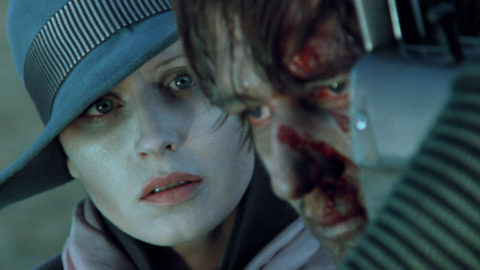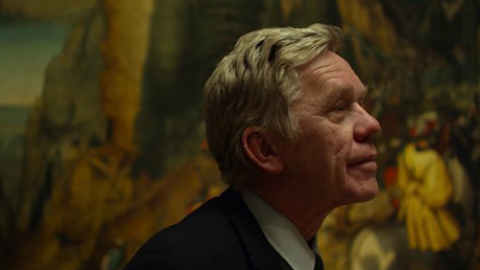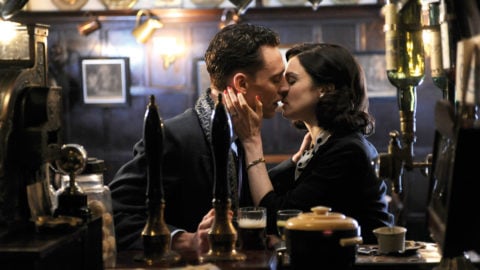By Jonathan Romney in the May-June 2016 Issue
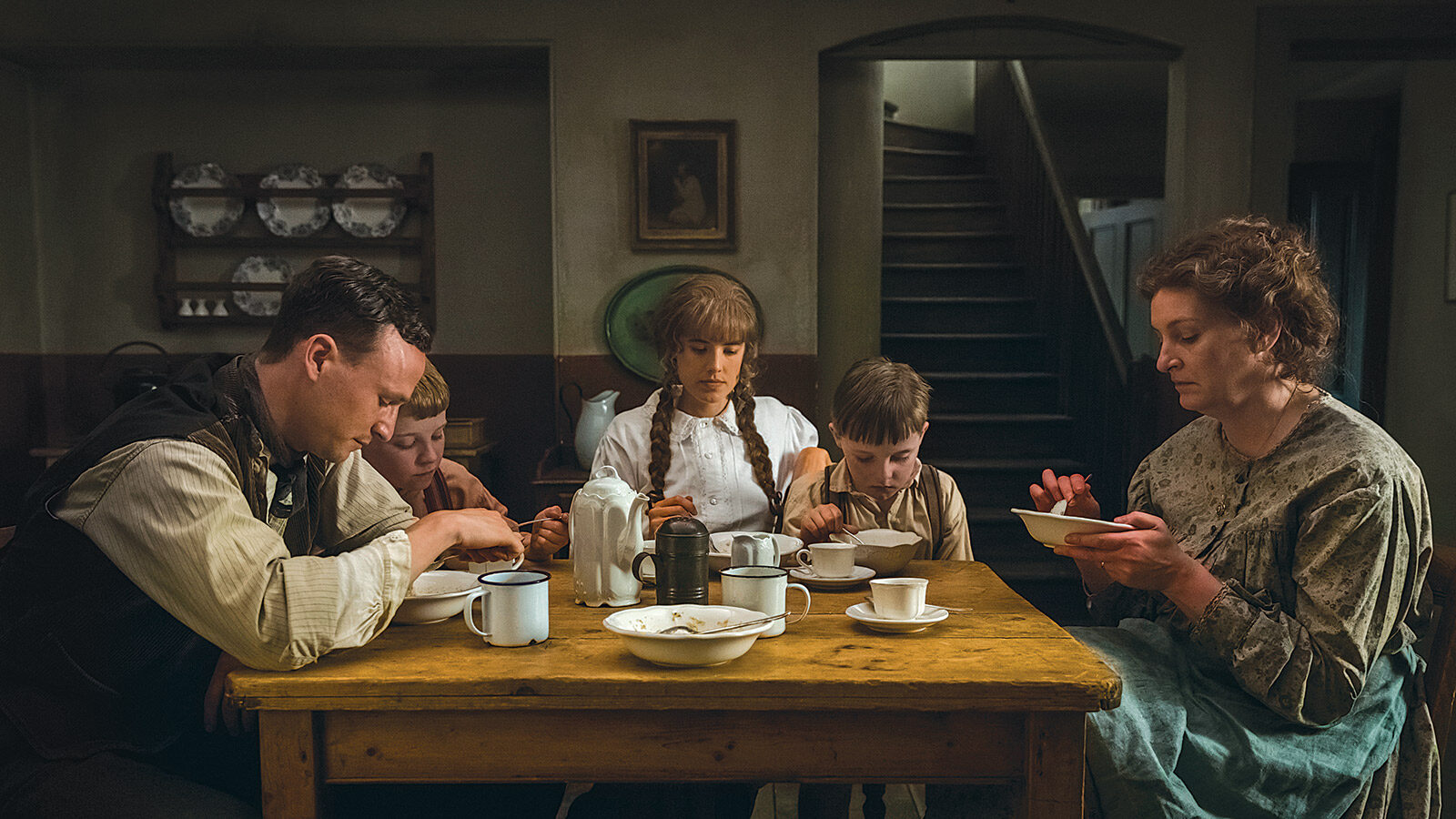
Hearth and Home
In Sunset Song, Terence Davies renders a young woman’s loves and strife with grandeur and austerity
Terence Davies’s Sunset Song was nearly one for the list of great apocryphal films. The British director originally attempted to make it after his 2000 adaptation of Edith Wharton’s The House of Mirth, but it was turned down by the body then overseeing British cinema, the UK Film Council—who, Davies remembers, told him, “It hasn’t got legs.” There followed a long gap in his career, broken in 2008 by Of Time and the City, an archival documentary about his native Liverpool. An intense chamber-drama treatment of Terence Rattigan’s The Deep Blue Sea followed in 2011—and now, at last, Davies has been able to return to Sunset Song.
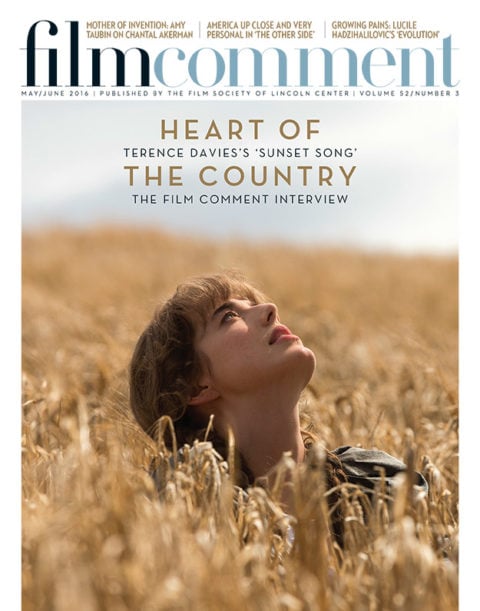
From the May-June 2016 Issue
Also in this issue
The film was a challenging project, not least because of the attendant expectations. Set in rural Scotland in the early 20th century, it is based on a 1932 novel by Lewis Grassic Gibbon, the first part of his trilogy A Scots Quair. The creation of a left-wing writer who emphasizes Scottish cultural and social autonomy, Sunset Song has an iconic status north of Hadrian’s Wall (unsurprisingly, it’s the favorite novel of Scottish National Party leader Nicola Sturgeon), but it’s a remarkable work by any measure, eminently modernist in its attention to the materiality of language and to the complex interweaving of personal and public history. Written using an English that incorporates the traditional Doric dialect, it’s crammed with words that will be unfamiliar to many readers—quean for “girl,” meikle for “big” or “much”—while its narrative register veers between the domestic and the cosmic, locating the inhabitants of the fictional Kinraddie, in northeast Scotland, within a broader sweep of history.
More specifically, the book recounts the coming-of-age of farmer’s daughter Chris Guthrie, torn between educational ambitions and her attachment to the land. The film’s Chris is Agyness Deyn, best known as a supermodel of singular, impish features, here in her second lead role. Davies, who claims to know nothing about popular culture, had never heard of Deyn, but knew when she auditioned that she was the perfect Chris. Deyn is remarkably affecting in the role, partly because she progresses so compellingly from innocence to experience, from composure through ecstasy to pain, and partly because her curiously old-fashioned face wouldn’t have looked out of place in the era of Peggy Ashcroft and Wendy Hiller.
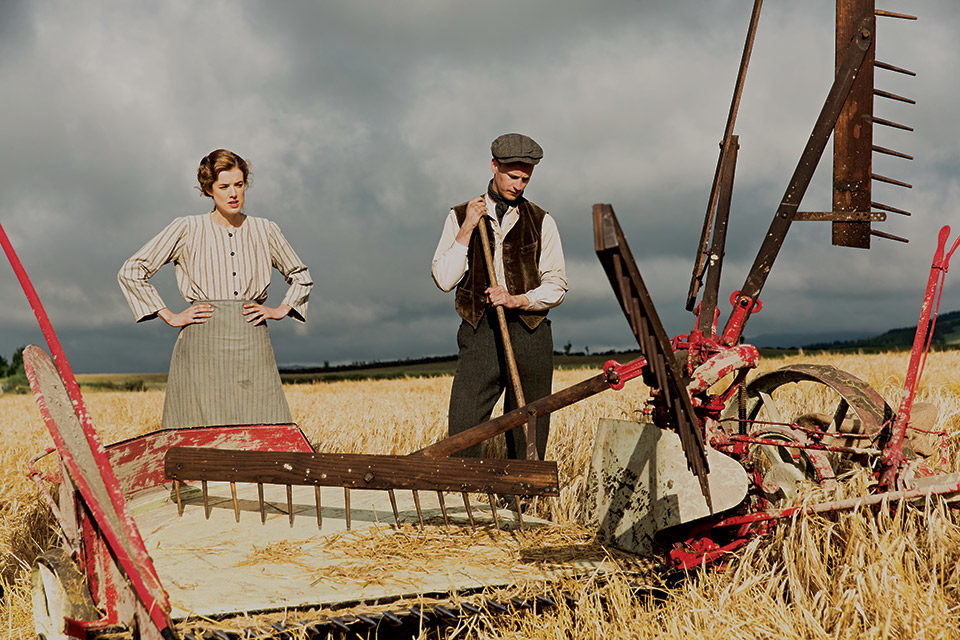
Sunset Song was shot partly in Scotland, but substantially in New Zealand for the summer scenes, with interiors shot in Luxembourg. As you’d expect from Davies, the film is at once lyrical and austere. The beauty of the landscapes is offset by an ever-present awareness of violence and danger, embodied partly by Chris’s father (Peter Mullan), whose attitude toward his daughter is terrifyingly like that of a Biblical patriarch, even down to his incestuous urgings. As for Chris’s happy marriage to local boy Ewan (Kevin Guthrie), that too is tainted by brutality, notably when he returns from military service a changed man.
While the film literally concludes with a song at sunset, the title indicates a lament for a certain society and era, brought to an end by World War I. That this is very much a story about war is signaled, late in the film, by an extended track over the desolate mud of northern France, while the reality of military service suddenly comes to the fore in an audacious narrative left-turn that transforms the film entirely.
This is unmistakably a Terence Davies film, partly in its themes (Mullan’s character is a close relation of the volatile father in Distant Voices, Still Lives), partly in its execution. Like Distant Voices, Still Lives and The Deep Blue Sea, with their pub sing-alongs, the film uses music—here traditional folk ballads—to evoke the identity of a community, sometimes in scenes (e.g., Chris’s wedding) of a marked formal theatricality. Visually, the enclosed spaces of Chris’s house eerily echo those of Distant Voices, Still Lives, their austerity suggesting a touch of Dreyer, while sweeping exteriors echo the romanticism of 1940s rural melodrama (Powell and Pressburger’s I Know Where I’m Going!, Ford’s How Green Was My Valley). The bleakness and the rapture are interwoven to altogether symphonic effect.
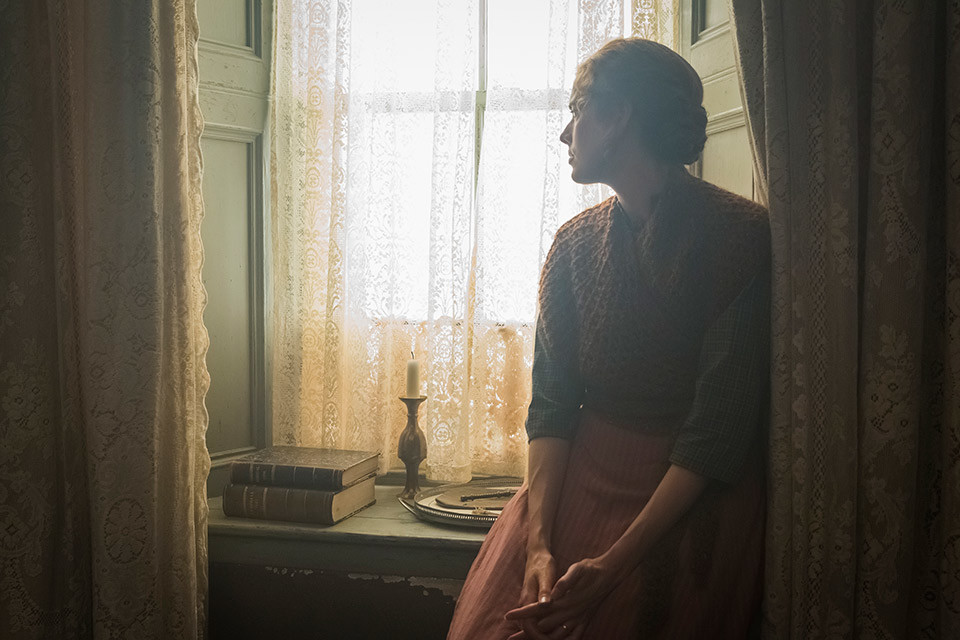
A similar sense of contrast prevails in Davies’s follow-up film, A Quiet Passion, about the cloistered life of poet Emily Dickinson. With Cynthia Nixon in the lead, and a superb supporting cast including Jennifer Ehle and Keith Carradine, it premiered to great acclaim at the Berlin Film Festival in February. As befits its reclusive heroine, it’s largely a claustrophobic chamber drama, and arguably Davies’s most uncompromisingly austere film since The Long Day Closes (92). But it’s also a film of often sensuous beauty, and in stretches, a surprisingly funny one too, as when the Dickinson sisters exchange brittle badinage with their witty friend Miss Vryling Buffam (Catherine Bailey)—sequences in which the Dickinson residence in Amherst really does become a House of Mirth.
I spoke to Terence Davies in London last December, while he was promoting Sunset Song.
You discovered Lewis Grassic Gibbon’s book through the BBC TV adaptation in the early ’70s.
Yes, I saw it in 1971. There used to be a Sunday serial then on BBC, and I’d never heard of the book. Vivien Heilbron was playing Chris, and I watched every episode. Then I read the book, which is quite hard-going for the first couple of chapters, but once you get past that, it really is a great work.
The story is wonderful—like Jane Eyre. It’s an intimate epic. Although he never gives Chris’s exact age, when the book starts she must be 14 or 15, and when it ends she’s only about 20. In those five or six years, she’s going though an enormous change. That in itself is powerful. But there are other things that run beneath it, particularly toward the end—the aspect of forgiving suffering, not just the suffering that’s been inflicted on her, but all suffering. The last chapter is about forgiveness and not despairing.
Given that the book is considered a Scottish national treasure, did anyone object to an English director filming it, or to Chris not being played by a Scottish actress?
No. It was at the back of my mind that if people don’t do a convincing Scottish accent, then people in Scotland would know. Agyness was the only one we had a voice coach for, but we couldn’t afford a coach for everyone. So I made it a general accent. But my ear isn’t acute enough to tell which part of Scotland that would appear to come from. It went down well in Edinburgh and Glasgow, and Ian Pirie, who plays Chae Strachan, said: “They’re a very hard audience in Aberdeen. They booed Billy Connolly off the stage.” That I was dreading—but I’ve never in all my life entered a room where there was such warmth and generosity.
Chris is an individual but at same time she’s an archetypal figure. She comes across in the book as an embodiment of the land and of the experience of women in rural communities. Given that, what were you looking for in casting the role?
Just someone who could look old and young at the same time. The only person I’ve ever seen pull it off is Joan Fontaine in Letter from an Unknown Woman: you believe that she’s a schoolgirl, and she was 30-odd years old when she did it. When I saw Agyness for the first time, it was a Monday morning, she was the first in, and she gave a wonderful audition, and I said: “We’ve found her.” She’s extraordinary, a real talent. The performance is truly innocent and pure, because she is. What she understands is that Chris actually is a poet—not an obvious poet, but her feeling toward that land and the world is essentially poetic.
How much did you want to keep the political resonances of the book?
None at all. I’m not political. I’m a socialist by instinct, but I’m not in any way political. I’m interested in the way that life and politics affect ordinary people. What Chris feels isn’t political, it’s emotional—do I stay on the land, do I become a teacher?
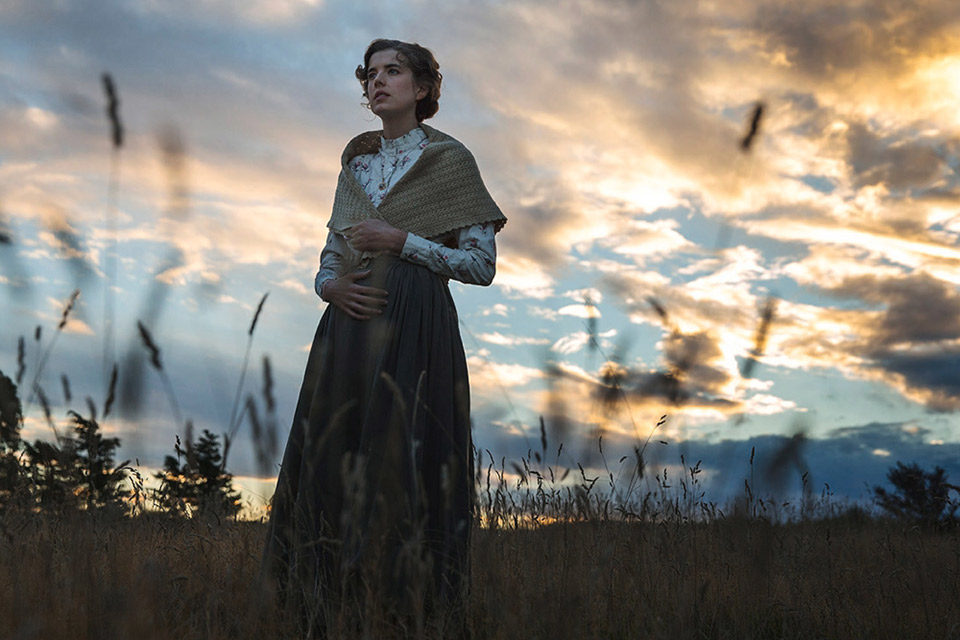
How did you plan the look of the film with DP Michael McDonough?
I said: “I don’t want any visual sentimentality, I don’t want pretty for the sake of prettiness. It’s got to be harsh, and in that harshness, there will be beauty.” And he got that. His eye is wonderful—he’s always looking.
The film’s tone is characterized by contrasts between vast landscape exteriors and often cramped interiors. We’re often looking out of windows onto the outside world.
I’m always drawn to people at windows, and empty rooms and staircases. I have absolutely no idea why. When we were doing it, [production designer] Andy Harris said: “Do you know a Danish painter called Vilhelm Hammershøi?” His paintings are basically empty rooms or windows, and if there is a subject, it’s usually a woman, usually with her back to the viewer. It’s like Vermeer, but with a smudged Northern light. I just thought they were breathtaking. I said the interiors have to look like that—that stillness you can get when nothing appears to be happening but a lot does, just through its stillness.
You’ve talked about shooting at a particular time of day known as the gloaming. Is that the same as “magic hour”?
No, the magic hour is earlier. Gloaming is the most wonderful word that you can’t translate. It’s not twilight and it’s not late evening, there’s a bit in-between. There’s a wonderful Richard Strauss song called “Im Abendrot,” which means “Red Evening,” and it’s always translated as “At Gloaming.” It’s a special time, and when you see it you think: “Yes, that’s gloaming.”
The film contains a number of very telling camera moves, as in the scene when Ewan comes home and forces Chris into the bedroom, and the camera just sinks down under the bed, hiding them from view.
I was rather proud of that. I said to them: “We’ll do this in one take. I’m not going to put you through this again.” It was really very powerful what they did. It’s much more interesting not to see something—you only hear, and that’s terrifying. It doesn’t have to be marital rape, it can be anything—but then you leave it and say to the audience: “You’ve got to fill in the gaps now.”
When you use music in your films, it’s very much as a part of characters’ lives. Here you use folk songs mentioned by Gibbon, with very specific meanings—like “Flowers of the Forest,” which is about death, and “Ladies of Spain” about sorrow and parting.
“Flowers of the Forest” was written by a Scottish noblewoman after [the battle of] Flodden—Henry VIII fought there and just slaughtered the Scots. It’s about slaughter. [Executive producer] Bob Last sent me three recordings, one by Ronnie Browne, which absolutely knocked me out, it was so moving. In the Doric dialect, you cannot understand a word of it, but you know what’s being said. “Ladies of Spain”—we found out it was a sea shanty, which was lovely. You don’t necessarily place them where they are in the book, but you make sure they’re in the right place, because a film isn’t a book.
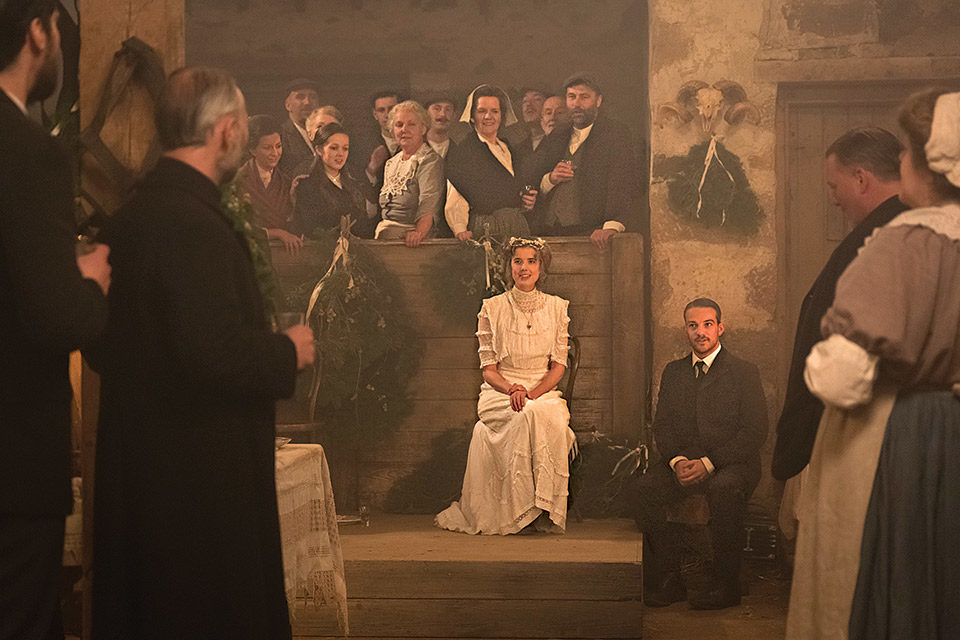
There are scenes in the book, which you’ve filmed, that speak very intensely of sexual danger in rural life—for example, the man’s hands grabbing Chris’s ankles in the barn.
Where her emerging sexuality is concerned, it was terrifying for people in that era, when they weren’t told anything. What do you do if someone doesn’t want to tell you that you menstruate? I can’t imagine. She doesn’t know anything and it does disturb her—and she’s clearly disturbed enough to look at herself in the mirror and think: “What am I now?” She’s not sure what she is—she’s on the cusp of womanhood but she’s still a child.
I wanted to make it powerful, in the sense that it’s an unknown thing, that was what was important—not necessarily its violence but that fact that she doesn’t know what it is. When she does find out what it is, it’s actually tender.
There’s a moment in the book when Chris slaps Ewan, early in their marriage—you don’t show that. In the book, anger seems integral to the state of marriage.
It was shot, but it just didn’t work—you didn’t believe it. I thought it was more interesting to keep the tenderness within their relationship, so that when Ewan comes back [from the army], it’s really shocking. It releases this rage: he’s angry because he’s terrified. But his redemption comes at the end when he says: “I deserted because I wanted to go back to her—I did it for her and I did it for Blawearie [farm], because I still love her.”
You probably don’t like budget cuts more than any other director, but there does seem to be something about your cinema that thrives on economy. The period drama of The House of Mirth works so well precisely because it’s pared down.
I look upon it as a moral duty—it’s not my money and it has to be husbanded, not wasted. The way I write the script, I write every track, every dissolve, everything, so when I go on set I know what the shots are, and that saves time. I couldn’t do that on the day, I’d just be too worried. I’d written the execution scene in a specific way and we couldn’t find [a location] anywhere. Andy Harris found this disused railway siding in Luxembourg—I thought [sarcastic tone] “Yeah. Fabulous.” I walked along the platform, and I thought: “We’ve found it. Give me 10 minutes and I’ll redo the shots.” It’s wonderful when you think: “We can’t do that—let’s do this.” That’s very exciting.
You went very quickly from Sunset Song to making A Quiet Passion.
I’ve never had so much work in my life. A Quiet Passion went without a single hitch, a joy from beginning to end. With Sunset Song, every single thing that could go wrong went wrong, I don’t know how we pulled it off. A Quiet Passion was the complete opposite.
What was it about Cynthia Nixon that made you want to cast her as Emily Dickinson?
I’d met her a number of years ago, when she was doing Sex and the City, for a film that never came off and I’ve never forgotten her. When I was writing the script, I could see her face because she’s very much like Emily Dickinson.
What are the aspects of Dickinson that most fascinated you?
She was a great poet—it all becomes terribly solemn. She never went anywhere except when she was 17, she went to a ladies seminary, and she spent her life in this house. But that doesn’t make it restricted—it makes it much more powerful, because these things were very important to her. It’s the stoicism of writing wonderful poetry that does not get published. I find that almost unbearably moving. I think a genius like that—and she was a genius—not getting recognized in their own time is the most unbearable thing. Having a posthumous reputation isn’t going to help them at all. Because she’s a poet, she sees things in a very different way—she has one skin missing.
IN FOCUS: Sunset Song opens on May 13.
Jonathan Romney is a contributing editor to FILM COMMENT and writes its Film of the Week column. He is a member of the London Film Critics Circle.



